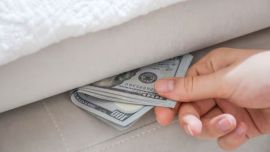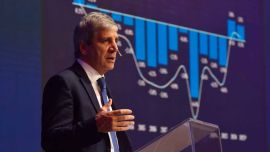Mauricio Macri unveiled a raft of measures this morning, declaring that he "understood" the difficitulties facing Argentines and taking steps to help "alleviate" their economic pain.
Speaking from the Olivos presidential residence before markets opened, the president announced tax breaks, bonuses and a higher minimum wage in the wake of his heavy defeat in PASO primary elections. Opposition leader Alberto Fernández emerged with a 15-point lead over the incumbent from Sunday's vote, deeply complicating the Juntos por el Cambio leader's chances of winning re-election.
The measures, which also include freezing fuel prices for 90 days, will have a budget impact of 40 billion pesos (US$720 million). The steps would not jeopardise the country’s ability to meet its primary fiscal goal, however, a statement issued by the Casa Rosada claimed.
The president also offered something of a mea culpa to both supporters and opponents, in contrast to his tetchy and irritable performance at a press conference at the Casa Rosada on Monday, during which he had hurled criticism at Kirchnerismo and his Peronist rival for the presidency.
This time out, Macri was keen to indicate that he understood the pain citizens are facing, amid heavy inflation, falling purchasing power and rising unemployment and poverty levels. "I want to apologise for the [press] conference on Monday," he said.
"I hesitated to do [the press conference] because I was still very affected by the result of Sunday. Also, without sleep and being sad about the consequences it had on the economy. But I prioritised [attending the conference] to calm doubts and anxieties," he said.
In a televised message, Macri said he "deeply respects the Argentines who voted for other alternatives" in Sunday's PASOs, assuring voters he "understood the result of the election," before announcing a raft of benefits for workers and small and medium sized businesses.
"I understand your anger, your fatigue," Macri said from the Olivos presidential residence. "I only ask you not to doubt the work we did together... there is too much at stake."
The Juntos por el Cambio leader said he had "heard what they told me on Sunday,” explaining that the new announcements were a response that would benefit “17 million workers and their families, and above all SMEs [small and medium sized businesses], which I know are going through a moment of uncertainty.”
“What happened in the election was my responsibility,” he said.
Measures
The measures are aimed at easing the impact of the economic recession and crisis, Macri said, and would improve the income of everyday citizens. The steps announced a rising of the tax-floor, subsidy increases and the rising of welfare payments, among others.
The president also announced a freeze on petrol prices for 90 days; two "extra payments" of Universal Child Allowance (AUH) of 1,000 pesos per month for unemployed and unregistered workers in September and October, a bonus at the end of the month of 5,000 pesos for state employees (including the Armed Forces and other members of the security forces) and a 40-percent rise in the Becas Progresar scholarship. He also said small and medium sized business would be able to benefit from a new plan designed to spread payments owed to the State.
"We want to help SMEs [small and medium sized businesses] because we recognise their value – we are launching a plan to help pay their obligations to AFIP over 10 years," he said.
Some two million people will now benefit from an extra 2,000 pesos per month (amounts vary, depending on income and classification) in September and October, the president announced, thanks to a 20-percent increase in the floor for income tax payments on earnings and "special deductions." This would be accompanied a refund of tax payments for some families already made – the example cited was a refund of around 12,000 pesos for a married family with two children, with a gross salary of 80,000 pesos per month.
The new non-taxable level for gross salaries has also been lifted to 55,376 pesos for a single worker and 70, 274 for a worker with a spouse and two children. Self-employed workers will also receive a 50-percent reduction in payments to AFIP they must pay the rest of the year.
In addition, for the second time this year, the minimum wage will rise, though there was no announcement was to how much – the final percentage will be defined by a special council, in which state representatives, workers and firms participate. It currently stands at around 12,500 pesos and though unions are seeking it to be brought in line with the basic food basket, as defined by INDEC, an increase of around 30 percent is anticipated.
In initial responses, some economists were sceptical about the impact the measures would have on voters.
“I think it’s difficult to see this changing the election results,” said Daniel Artana, chief economist at FIEL, a research firm in Buenos Aires. “The difference is really big, it’s really hard to reverse the primary results.”
Hammering
Since Sunday's vote, Argentina's currency and its assets on both local and international markets have taken a heavy hit. The peso slipped further against the dollar Tuesday, although there was some recovery in the stock market.
The national currency – which plummeted 18.76 percent on Monday – closed a further 1.77 percent down on Tuesday after the Central Bank had intervened to stave off bigger falls following losses of more than three percent by midday.
The peso traded at 58.33 pesos to the dollar, as against 57.30 at Monday's close. The stock market rebounded 10 percent on Tuesday after having lost 38 percent in Monday's rout.
The Buenos Aires Stock Exchange Merval Index closed Tuesday up 10.22 percent, recovering some of the losses shipped following Macri's defeat.
– TIMES/PERFIL/TÉLAM/AFP






















Comments